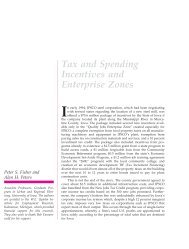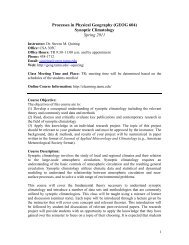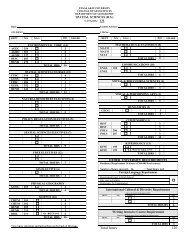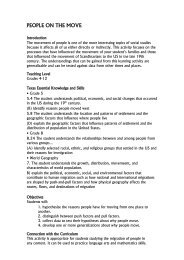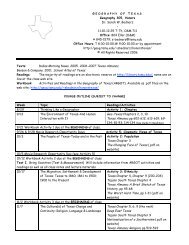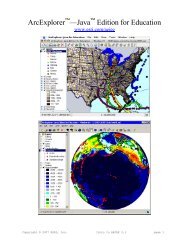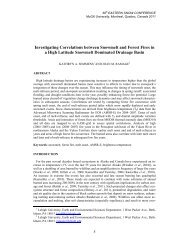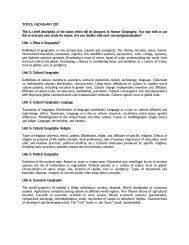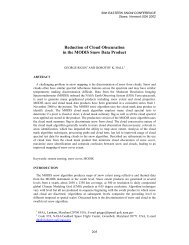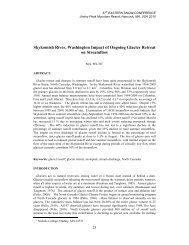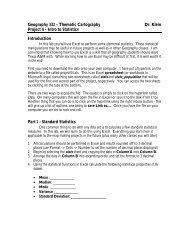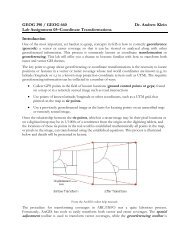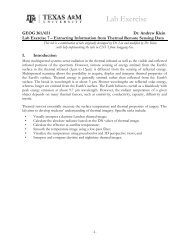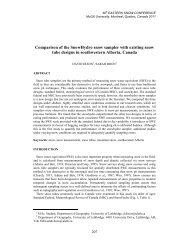Texas Social Studies Framework - Department of Geography ...
Texas Social Studies Framework - Department of Geography ...
Texas Social Studies Framework - Department of Geography ...
Create successful ePaper yourself
Turn your PDF publications into a flip-book with our unique Google optimized e-Paper software.
58<br />
58<br />
Chapter 5: The Teaching-Learning System: Curriculum, Instruction, and Assessment<br />
Figure 27: Designing a Performance Task<br />
The following items provide the logic (not necessarily the linear steps) for designing a performance task.<br />
ü Identify the TEKS and develop indicators <strong>of</strong> student achievement.<br />
• Select the appropriate TEKS from the TEKS for <strong>Social</strong> <strong>Studies</strong>. What should students know and understand?<br />
Select the appropriate social studies skills from the TEKS for <strong>Social</strong> <strong>Studies</strong>. What should students<br />
be able to do?<br />
• What would application <strong>of</strong> the TEKS look like? Which real-world businesses or groups utilize similar<br />
knowledge and skills in their work?<br />
• What range <strong>of</strong> performances and/or products can you expect from students given their knowledge and<br />
understanding? What should students be able to do?<br />
• Determine the criteria for evidence <strong>of</strong> successful student achievement. How will you know that students<br />
know, understand, and can apply the key concepts and ideas to a new situation?<br />
ü Set an inquiry question.<br />
• Develop a social studies inquiry question. It can integrate several TEKS and TEKS content strands. The<br />
inquiry question guides the teaching and engages students in uncovering the important ideas at the heart <strong>of</strong><br />
social studies.<br />
ü Develop a context for the assessment.<br />
• Select an appropriate context for the inquiry question. The context establishes a realistic situation and<br />
hooks students to the task. What types <strong>of</strong> activities used by adults in the field <strong>of</strong> study could be simulated<br />
by the students?<br />
• What role will students assume? Who is the intended audience? What does the situation reveal about<br />
dilemmas faced, opportunities provided, and expectations that must be met?<br />
ü Identify products and/or performance.<br />
• Select the appropriate products and/or performances which will provide evidence <strong>of</strong> what students know<br />
and are able to do. Keep the inquiry question in mind and the need for measurable and observable criteria<br />
for successful performance.<br />
ü Develop instructions for the assessment.<br />
• What tasks will students perform during the assessment in order to demonstrate what they know/are able to<br />
do?<br />
• How long will students have to complete the task? To whom will they present their work?<br />
• What types <strong>of</strong> resources will be needed by the students? Will all students have fair access to them?<br />
• Will students be allowed to work alone or in groups; in class, out <strong>of</strong> class? If students work in groups, how<br />
will you assess for individual achievement? If work outside <strong>of</strong> class is allowed, how will you ensure that<br />
persons other than the student have not constructed the responses?<br />
• Will opportunities be provided for self/peer assessment followed by revision?<br />
ü Design scoring tools.<br />
• Determine the criteria necessary for successful student products and performances, e.g., understanding,<br />
reasoning, accuracy <strong>of</strong> information, communication. Will a rubric specific to the content <strong>of</strong> the task be<br />
needed? Describe each criterion and include observable indicators.<br />
• Incorporate the criteria and indicators into a scoring tool. Determine the number <strong>of</strong> levels <strong>of</strong> performance<br />
ranging from expert to novice level. Will all criteria be weighted equally?<br />
ü Review and revise the task design.<br />
• Review the entire assessment development process before administering it to your students. Is it fair to all<br />
students? Does it provide students with appropriate feedback to allow them to improve their performance?<br />
Does it accurately reflect the TEKS expectations?



